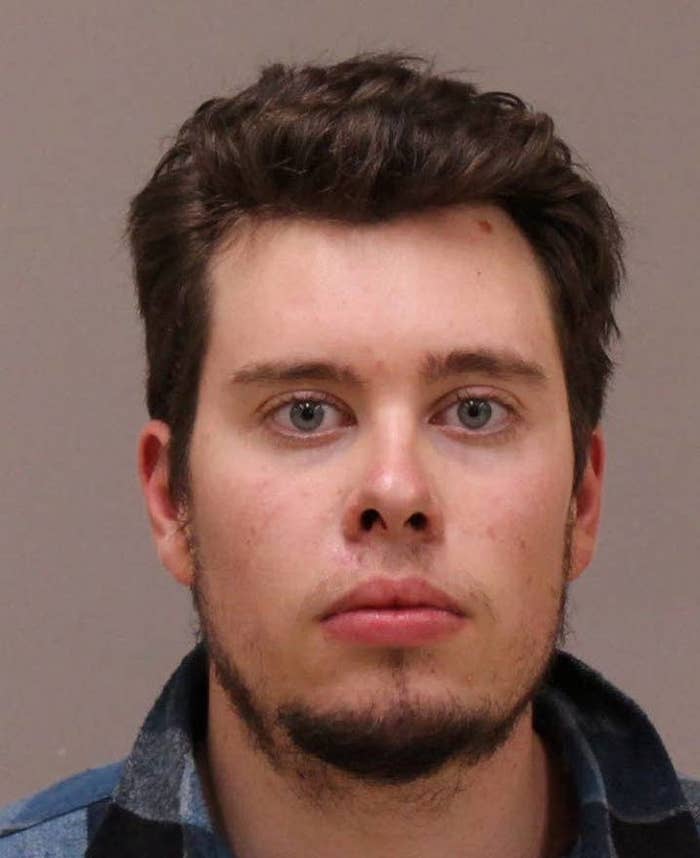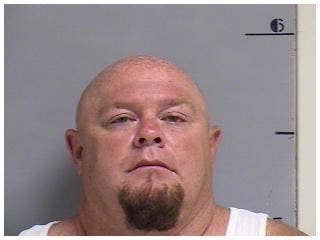
On a day dominated by a star witness’s testimony that he participated in a plot to kidnap Michigan Gov. Gretchen Whitmer, a fight over another potential witness threatened to boil over in the federal court where four men are on trial for their alleged roles in the scheme.
Ty Garbin, a member of the Wolverine Watchmen, told jurors that he and other members of the militant group trained and bought weapons in order to “prepare for the plan to kidnap the governor.” Garbin, who pleaded guilty over a year ago and is cooperating with the government, added that he and the other defendants had developed the scheme on their own and that they weren’t induced to take part by confidential informants working for the FBI.
But defense attorneys believe one of those informants could tell a very different story. In a motion filed Wednesday, the defense attorneys asked the court to compel him to testify despite his stated intentions to plead the Fifth Amendment. The informant, Stephen Robeson, played a key role in the government’s investigation, but prosecutors later called him a “double agent” and threatened to charge him with perjury if he testified that the government had entrapped the defendants in the case.
Robeson “wishes to hide behind a threat of prosecution that has no basis,” attorneys for defendants Adam Fox and Barry Croft wrote, arguing that he couldn’t be prosecuted for actions he took with the FBI’s authorization. They claim Robeson and others pushed their clients to do things they would not otherwise have done and planted the idea to consider kidnapping Whitmer in their heads. For that reason, they argued, Robeson “should be compelled to answer questions put to him regarding his efforts on behalf of the government.”
Prosecutors, who do not intend to call Robeson as a witness, said they were surprised by the motion and said they would respond to it before the weekend. While they have previously claimed the defense should feel free to call Robeson, recent court filings revealed that in late 2020 the government had him sign a nondisclosure agreement urging him not to discuss details of the case and have questioned whether he should even be allowed to take the stand.
Robeson could, at least in theory, provide a boost to the defense, which has weathered seven days of damning testimony from a string of FBI agents, a different confidential informant, and Garbin.
Prosecutors claim that Fox, Croft, Daniel Harris, and Brandon Caserta, angered over COVID-19 lockdowns, conspired during summer 2020 to kidnap Whitmer and took concrete steps to move that plan forward, including twice surveilling her vacation cottage in northern Michigan and agreeing to buy explosives to blow up a bridge near her home. The men were arrested in October 2020; the trial, expected to last up to six weeks, began on March 8 in Grand Rapids.
Garbin, a 26-year-old airplane mechanic whom prosecutors have called a “star witness,” took the stand Wednesday morning in handcuffs and a prison uniform. He is currently serving out a 75-month sentence for his role in the alleged plot.
Under examination by Assistant US Attorney Nils Kessler, he told jurors that he joined the Watchmen in early 2020 because of his interest in gun rights and libertarian political ideas but soon became interested in linking up with others to take action against political figures. Using encrypted messaging apps and even coming up with code words for explosives and weaponry, Garbin and others forged an alliance. While the group first considered a plan to storm Michigan’s capitol building and take hostages, Garbin testified that “he was not a fan” of that idea and instead was “much more open ears to” a plot to kidnap Whitmer.
His testimony reinforced that of Dan Chappel, a confidential informant who agreed to work for the FBI after joining the Watchmen and growing concerned about their violent rhetoric. Chappel, who was in the witness box for three days and has twice testified in related cases in Michigan state court, claimed his role in the investigation was to provide “access” to his FBI handlers and to “de-escalate” situations that threatened to explode into violence.
As an example, he noted on multiple occasions, he had suggested to the defendants that they shoot a bullet into Whitmer’s house and then mail the casing to her “to send a message.” He claimed he proposed this as an alternative to actually kidnapping her. He referred to that plan as a “stray bullet,” which he claimed could be shot into the house when the governor wasn’t present.

Defense attorneys, in their cross-examinations, portrayed Chappel as an informant who went far over the line, becoming the Watchmen’s second-in-command and going out of his way to provoke defendants into expressing violent ideas while the secret recording devices he carried with him were running.
After prosecutors played audio of Caserta ranting about COVID-19 vaccines and wanting to kill contact tracers, for example, defense attorneys pointed to a lengthy private meeting Chappel held at the defendant’s apartment. Over the course of hours, attorneys said, Chappel worked to elicit increasingly angry ideas from Caserta, a volatile personality with strong anti-government views. When Caserta expressed disinterest in violence against politicians, whom he called “puppets,” Chappel turned to a topic that resonated more deeply. “Give me something you hate,” the informant urged.
The defense attorneys suggest that prosecutors have cherry-picked evidence to leave out important context and minimize the role that the government and its operatives played in constructing the plan and spurring people to action.
That influence, they suggested, extended to Garbin and his testimony. During cross-examination, Julia Kelly, Harris’s defense attorney, noted that Garbin was cooperating in exchange for leniency and that his sentence could be reduced based on his appearance in court. She pointed out multiple apparent inconsistencies between what he said in court on Wednesday and statements he made to the FBI following his arrest on Oct. 7, 2020.
While Garbin testified that the Watchmen had trained to prepare to kidnap Whitmer, for example, he previously told the FBI that the sessions were "just to hang out and drink beer.” And while he told the jury that he and the other defendants were fully on board with a nighttime mission to surveil Whitmer’s home, the transcript of his FBI interview shows he claimed he and the others were not even sure what they were doing that night and were “turned off” and upset when they found out it was a reconnaissance mission.
Robeson, a Wisconsin resident who has been convicted of multiple felonies, was along for the ride that night. He also recruited Croft into the scheme and organized multiple events where, prosecutors say, vague grievances were fashioned into a secret and decidedly violent plan.
Defense attorneys have focused on his behavior while under FBI supervision and want him to testify about how the government conducted the overall case.
Robeson iis the only “direct link that the defendants have to the alleged conspiracy because of his actions, coordination, and planning on behalf of the government,” the lawyers wrote in their motion. “The government and Robeson’s handlers were aware of his actions and acquiesced in allowing him to do so.”
Judge Robert Jonker said that he would hold a hearing as soon as next week to determine whether Robeson’s stated intention to invoke his right not to incriminate himself is valid under the circumstances presented in this case.
But he also told defense attorneys that they should be careful what they wish for, pointing to an interview that Robeson gave to a local TV news reporter while making a surprise appearance at the courthouse during jury selection earlier this month.
“He certainly said things that would be inconsistent with your entrapment defense,” Jonker warned.
